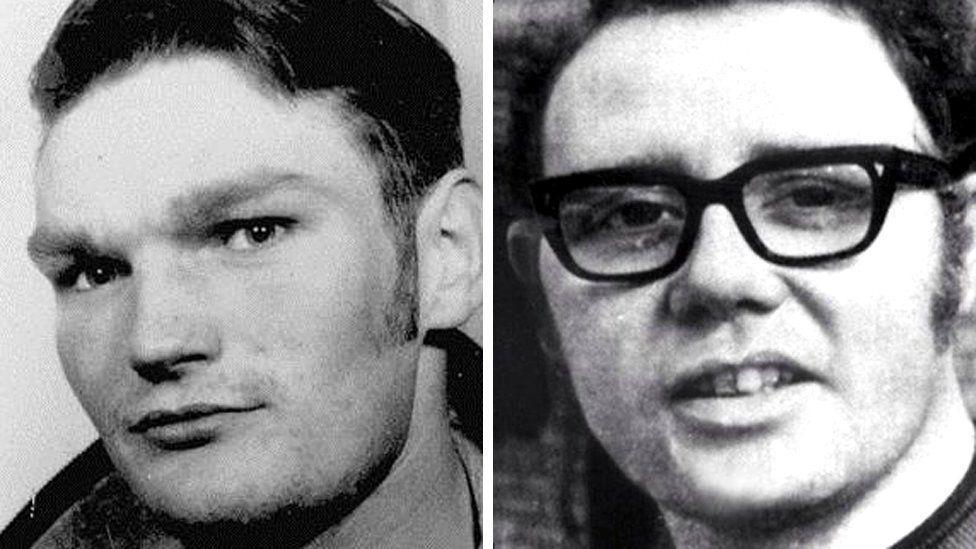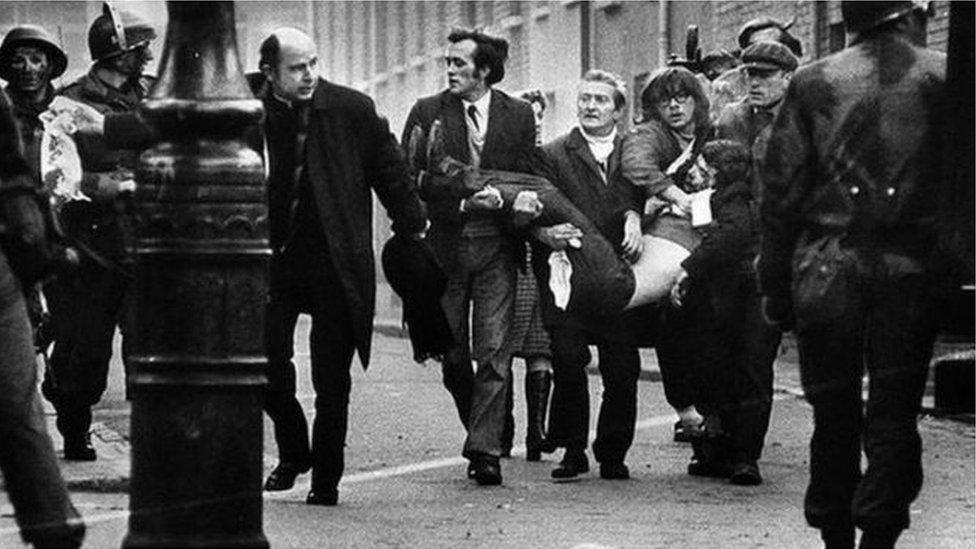Soldier F trial hears soldiers' Bloody Sunday statements

Soldier F is accused of murdering James Wray (left) and William McKinney
- Published
Military witness statements provided at the time of Bloody Sunday in Londonderry in 1972 have been read out at the trial of Soldier F.
The Army veteran denies two charges of murder and five of attempted murder.
Statements made 53 years ago by Soldier G and Soldier H place the defendant at Glenfada Park North and opening fire.
Soldier G is deceased and Soldier H is unwilling to testify, using his legal privilege against self-incrimination.
At an earlier stage of the trial, Judge Patrick Lynch rejected a bid to have the statements omitted as evidence.
The defence claim they are unreliable.
The Army veteran, whose anonymity is protected by a court order, denies murdering James Wray, 22, and William McKinney, 26.
Soldier F is further accused of attempting to murder Michael Quinn, Patrick O'Donnell, Joseph Friel, Joe Mahon, and an unknown person.
The case is being heard by a judge sitting without a jury at Belfast Crown Court.
'Shot a third man'
Soldier G's account of events given to the Royal Military Police (RMP) and the Widgery Tribunal were read by a prosecution lawyer on Tuesday.
In the statements, Soldier G claimed they had come under fire.
He then alleged both he and Soldier F shot at two men "holding what appeared to be small rifles".
Both fell to the ground.
In later accounts, Soldier G said he may have shot both men, while Soldier F "shot a third man".
Soldier H, in his RMP statements, claimed they had shot at youths with nail bombs.
He stated he saw Soldier F firing.
Soldier H said he was in the company of soldiers F and G when he saw three youths in "in possession of nail bombs".
In his account to the RMP he said he took aim at the youth in the middle of the group and said he saw "the other soldiers" fire rounds "at the other persons".
'I realised I had been shot'
Earlier, statements made by Mr O'Donnell, who died 20 years ago, were also read into evidence.
They were made to the Widgery Tribunal in 1972 and the Saville Inquiry in 1999 and described him being shot at Glenfada Park North.
He recalled hearing a "crack" followed by "a burning feeling" in his shoulder.
"I put my left hand up to my shoulder and there was blood on it. I was not really in pain at the time but I realised I had been shot. Some smoke came from my shoulder," he said.
"I did not see a soldier in the act of shooting me," Mr O'Donnell stated.
He said he remembered "dust coming from the wall as I was shot" and being helped by a woman who was also sheltering at the gable wall.
He said when he was later "marched" out of the area by soldiers, he could only raise one arm above his head due to his injury.
Mr O'Donnell said he was never searched nor offered medical attention, adding he saw no civilians with guns or weapons at any stage.
'Pandemonium'
A statement given to police in 2014 by John McCourt was also submitted in evidence.
Mr McCourt said he told his family to go to the safety of a relative's house in Glenfada Park when they had become aware of trouble at the junction of William Street and Rossville Street.
He said as he followed a short time later he was struck in the thigh by a rubber bullet fired by a soldier.
"He aimed in my direction with a rubber bullet gun, which he held at shoulder height," he said.
Mr McCourt said he "ran at full speed into the square at Glenfada Park" where there was "pandemonium".
In Glenfada Park North, he said he heard "high velocity rifle shots", but did not see who fired them.
Mr McCourt was hiding under dust bins and through a gap observed three soldiers, one of them kneeling down.
He escaped the courtyard by crawling on his hands and knees into a relation's house.
The statements of two other eye witnesses were ruled inadmissible by the judge.
The trial continues.
Who is Soldier F?
Soldier F is a former British soldier who served with the Army's Parachute Regiment in Northern Ireland during the Troubles.
He cannot be named due to an interim court order granting his anonymity.
The decision to charge Soldier F was taken by the Public Prosecution Service (PPS) in 2019.
He was one of 18 former soldiers reported to the PPS as a result of a police investigation, which followed the public inquiry into Bloody Sunday conducted by Lord Saville.
He was the only one charged.
Two years later, the PPS dropped the case after the collapse of the trial of two other veterans who had been accused of a 1972 murder in Belfast.
The prosecution resumed in 2022 after a legal challenge.
